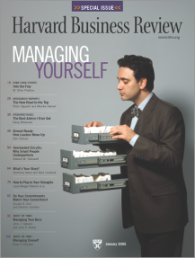Chronic busyness is bad for your brain…

Traffic jams and overloaded brains are the products of modern life. And they are similar in significant ways. Traffic slows when there are too many automobiles on a roadway, producing irritated drivers and causing accidents. Brain overload also produces jams, affecting productivity, relationships and mental states — “distractibility, inner frenzy, and impatience” as well as “difficulty staying organized, setting priorities, and managing time.”
This “brain jam” is very similar to what we know as ADD or attention deficit disorder (now called attention-deficit/hyperactivity disorder), according to Dr. Edward Hallowell. This similarity became apparent to Dr. Hallowell, a former member of the Harvard Medical School faculty, as he treated patients in the mid-90s. His name for this new pathology is “attention deficit trait” (ADT).
Attention deficit trait is characterized by ADD’s negative symptoms. Rather than being rooted in genetics, however, ADT is purely a response to the hyperkinetic environment in which we live. Indeed, modern culture all but requires many of us to develop ADT. Never in history has the human brain been asked to track so many data points. Everywhere, people rely on their cell phones, e-mail, and digital assistants in the race to gather and transmit data, plans, and ideas faster and faster. One could argue that the chief value of the modern era is speed, which the novelist Milan Kundera described as “the form of ecstasy that technology has bestowed upon modern man.” Addicted to speed, we demand it even when we can’t possibly go faster. … As the human brain struggles to keep up, it falters and then falls into the world of ADT. …
As a psychiatrist who has diagnosed and treated thousands of people over the past 25 years for a medical condition called attention deficit disorder, or ADD (now known clinically as attention-deficit/hyperactivity disorder), I have observed firsthand how a rapidly growing segment of the adult population is developing this new, related condition. The number of people with ADT coming into my clinical practice has mushroomed by a factor of ten in the past decade. Unfortunately, most of the remedies for chronic overload proposed by time-management consultants and executive coaches do not address the underlying causes of ADT.
Unlike ADD, a neurological disorder that has a genetic component and can be aggravated by environmental and physical factors, ADT springs entirely from the environment. Like the traffic jam, ADT is an artifact of modern life. It is brought on by the demands on our time and attention that have exploded over the past two decades. As our minds fill with noise—feckless synaptic events signifying nothing—the brain gradually loses its capacity to attend fully and thoroughly to anything.
The symptoms of ADT come upon a person gradually. The sufferer doesn’t experience a single crisis but rather a series of minor emergencies while he or she tries harder and harder to keep up. Shouldering a responsibility to “suck it up” and not complain as the workload increases, executives with ADT do whatever they can to handle a load they simply cannot manage as well as they’d like. The ADT sufferer therefore feels a constant low level of panic and guilt. Facing a tidal wave of tasks, the executive becomes increasingly hurried, curt, peremptory, and unfocused, while pretending that everything is fine.
Dr. Hallowell’s article, “Overloaded Circuits: Why Smart People Underperform,” was published several years ago in the Harvard Business Review. He concludes with a long list of suggestions for coping with work induced ADT, ranging from diet and exercise to schedule management.
While Dr. Hallowell’s essay provides insights into the loss of the ability to focus at work, he only whets the appetite for a more substantial understanding into how technology—and the modern world more generally—shapes our lives. Four books can be suggested to fill this void:
· Virtually You: The Dangerous Powers of the E-Personality by Elias Aboujaoude
· The Shallows: What the Internet Is Doing to Our Brains by Nicholas Carr
· Alone Together: Why We Expect More from Technology and Less from Each Other by Sherry Turkle
· The World Beyond Your Head: On Becoming an Individual in an Age of Distraction by Matthew B. Crawford


 May 13, 2015
May 13, 2015 







Comments are closed.